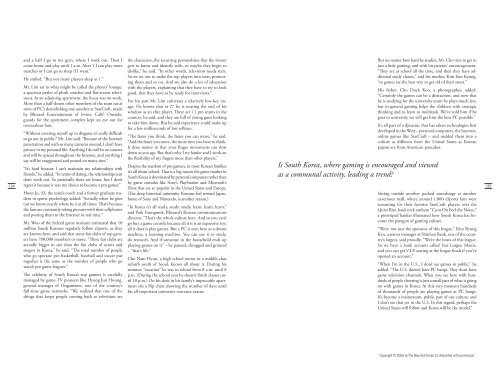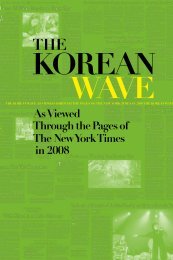The Korean Wave 2006 - Korean Cultural Service
The Korean Wave 2006 - Korean Cultural Service
The Korean Wave 2006 - Korean Cultural Service
Create successful ePaper yourself
Turn your PDF publications into a flip-book with our unique Google optimized e-Paper software.
124<br />
and a half I go to my gym, where I work out. <strong>The</strong>n I<br />
come home and play until 1 a.m. After 1 I can play more<br />
matches or I can go to sleep if I want.”<br />
He smiled. “But not many players sleep at 1.”<br />
Mr. Lim sat in what might be called the players’ lounge:<br />
a spacious parlor of plush couches and flat-screen televisions.<br />
In an adjoining apartment, the focus was on work.<br />
More than a half-dozen other members of the team sat at<br />
rows of PC’s demolishing one another at StarCraft, made<br />
by Blizzard Entertainment of Irvine, Calif. Outside,<br />
guards for the apartment complex kept an eye out for<br />
overzealous fans.<br />
“Without covering myself up in disguise it’s really difficult<br />
to go out in public,” Mr. Lim said. “Because of the Internet<br />
penetration and with so many cameras around, I don’t have<br />
privacy in my personal life. Anything I do will be on camera<br />
and will be spread throughout the Internet, and anything I<br />
say will be exaggerated and posted on many sites.”<br />
“It’s hard because I can’t maintain my relationships with<br />
friends,” he added. “In terms of dating, the relationships just<br />
don’t work out. So personally there are losses, but I don’t<br />
regret it because it was my choice to become a pro gamer.”<br />
Hoon Ju, 33, the team’s coach and a former graduate student<br />
in sports psychology, added: “Actually when he goes<br />
out we know exactly where he is at all times. That’s because<br />
the fans are constantly taking pictures with their cellphones<br />
and posting them to the Internet in real time.”<br />
Mr. Woo of the federal game institute estimated that 10<br />
million South <strong>Korean</strong>s regularly follow eSports, as they<br />
are known here, and said that some fan clubs of top gamers<br />
have 700,000 members or more. “<strong>The</strong>se fan clubs are<br />
actually bigger in size than the fan clubs of actors and<br />
singers in Korea,” he said. “<strong>The</strong> total number of people<br />
who go spectate pro basketball, baseball and soccer put<br />
together is the same as the number of people who go<br />
watch pro game leagues.”<br />
<strong>The</strong> celebrity of South Korea’s top gamers is carefully<br />
managed by game-TV pioneers like Hyong Jun Hwang,<br />
general manager of Ongamenet, one of the country’s<br />
full-time game networks. “We realized that one of the<br />
things that keeps people coming back to television are<br />
the characters, the recurring personalities that the viewer<br />
gets to know and identify with, or maybe they begin to<br />
dislike,” he said. “In other words, television needs stars.<br />
So we set out to make the top players into stars, promoting<br />
them and so on. And we also do a lot of education<br />
with the players, explaining that they have to try to look<br />
good, that they have to be ready for interviews.”<br />
For his part Mr. Lim cultivates a relatively low-key image.<br />
He knows that at 27 he is nearing the end of his<br />
window as an elite player. <strong>The</strong>re are 11 pro teams in the<br />
country, he said, and they are full of young guns looking<br />
to take him down. But he said experience could make up<br />
for a few milliseconds of lost reflexes.<br />
“<strong>The</strong> faster you think, the faster you can move,” he said.<br />
“And the faster you move, the more time you have to think.<br />
It does matter in that your finger movements can slow<br />
down as you age. But that’s why I try harder and I work on<br />
the flexibility of my fingers more than other players.”<br />
Despite the stardom of pro gamers, in most <strong>Korean</strong> families<br />
it’s all about school. That is a big reason the game market in<br />
South Korea is dominated by personal computers rather than<br />
by game consoles like Sony’s PlayStation and Microsoft’s<br />
Xbox that are so popular in the United States and Europe.<br />
(<strong>The</strong> deep historical animosity <strong>Korean</strong>s feel toward Japan,<br />
home of Sony and Nintendo, is another reason.)<br />
“In Korea it’s all study, study, study, learn, learn, learn,”<br />
said Park Youngmok, Blizzard’s <strong>Korean</strong> communications<br />
director. “That’s the whole culture here. And so you can’t<br />
go buy a game console because all it is is an expensive toy;<br />
all it does is play games. But a PC is seen here as a dream<br />
machine, a learning machine. You can use it to study,<br />
do research. And if someone in the household ends up<br />
playing games on it” – he paused, shrugged and grinned<br />
– “that’s life.”<br />
Cho Nam Hyun, a high school senior in a middle-class<br />
suburb south of Seoul, knows all about it. During his<br />
summer “vacation” he was in school from 8 a.m. until 8<br />
p.m. (During the school year he doesn’t finish classes until<br />
10 p.m.) On his desk in his family’s impeccable apartment<br />
sits a flip chart showing the number of days until<br />
his all-important university entrance exams.<br />
But no matter how hard he studies, Mr. Cho tries to get in<br />
just a little gaming, and with his parents’ encouragement.<br />
“<strong>The</strong>y are at school all the time, and then they have additional<br />
study classes,” said his mother, Kim Eun Kyung,<br />
“so games are the best way to get rid of their stress.”<br />
His father, Cho Duck Koo, a photographer, added:<br />
“Certainly the games can be a distraction, and now that<br />
he is studying for the university exam he plays much less,<br />
but in general gaming helps the children with strategic<br />
thinking and to learn to multitask. We’ve told him if he<br />
goes to university we will get him the best PC possible.”<br />
It’s all part of a dynamic that has taken technologies first<br />
developed in the West – personal computers, the Internet,<br />
online games like StarCraft – and melded them into a<br />
culture as different from the United States as <strong>Korean</strong><br />
pajeon are from American pancakes.<br />
Is South Korea, where gaming is encouraged and viewed<br />
as a communal activity, leading a trend?<br />
Sitting outside another packed soundstage at another<br />
cavernous mall, where around 1,000 eSports fans were<br />
screaming for their favorite StarCraft players over the<br />
Quiet Riot hard-rock anthem “Cum On Feel the Noize,”<br />
a pinstriped banker illustrated how South Korea has become<br />
the paragon of gaming culture.<br />
“We’re not just the sponsors of this league,” Kim Byung<br />
Kyu, a senior manager at Shinhan Bank, one of the country’s<br />
largest, said proudly. “We’re the hosts of this league.<br />
So we have a bank account called Star League Mania,<br />
and you can get V.I.P. seating at the league finals if you’ve<br />
opened an account.”<br />
“When I’m in the U.S., I don’t see games in public,” he<br />
added. “<strong>The</strong> U.S. doesn’t have PC bangs. <strong>The</strong>y don’t have<br />
game television channels. What you see here with hundreds<br />
of people cheering is just a small part of what is going<br />
on with games in Korea. At this very moment hundreds<br />
of thousands of people are playing games at PC bangs.<br />
It’s become a mainstream, public part of our culture, and<br />
I don’t see that yet in the U.S. In this regard, perhaps the<br />
United States will follow and Korea will be the model.”<br />
125<br />
Copyright © <strong>2006</strong> by <strong>The</strong> New York Times Co. Reprinted with permission.





